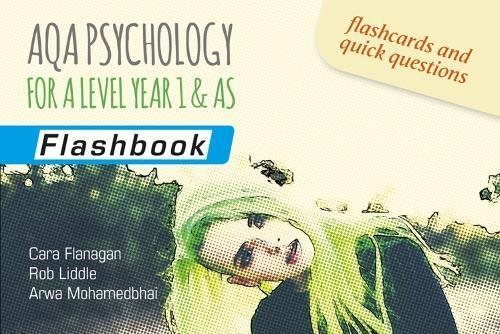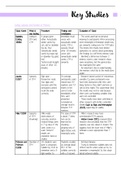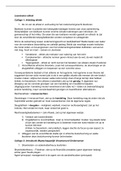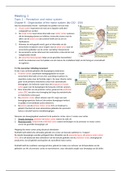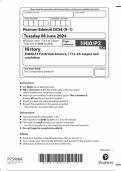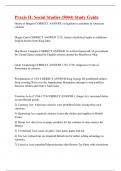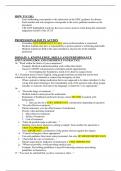Coding, Capacity and Duration of Memory:
Study Name What it Procedure Findings and Evaluation of Study
was testing Conclusions
Baddeley Coding in 4 groups given Immediate recall - The words used had no personal
(1966a, STM and either: Acoustically worse with meaning to participants. When processing
1966b) LTM similar words (e.g. acoustically similar more meaningful information people may
cat, cab) or dissimilar words, STM is use semantic coding even for STM tasks.
(e.g. pit, few). acoustic. Recall This means the results have limited
Semantically similar after 20 minutes application, be careful about generalising
words (e.g. large, big) worse with the findings to a different memory task
or dissimilar (e.g. good, semantically similar + Identified a difference between 2
hot) words, LTM is memory stores. Later research shows
Tested recall straight semantic. some exceptions, but the general idea
away of after 20 has maintained the same.
minutes. + An important step in understanding
the memory which led to the multi-store
model.
Jacobs Capacity Digit span – On average, - Research lacked control of extraneous
(1887) of STM Researcher reads participants could variables. E.g. some participants may
four digits and repeat back 9.3 have been distracted while they were
increases until the numbers and 7.3 being tested so they didn’t perform as
participant cannot letters in the well as they might. This would mean that
recall the order correct order the results may not be valid because
correctly. immediately after there were confounding variables that
they were were not controlled.
presented. + These results have been confirmed in
Concluded on other research with better controlled
average recall is studies (such as Bopp and Werhaeghen
between 5-9 2005), supporting its validity.
numbers.
Miller (1956) Capacity Miller made The span of STM - Miller’s research may have
of STM observations of is about 7 items overestimated STM capacity.
(chunking)
everyday practice. but can be - Nelson Cowan 2001, reviewed other
Noticed things come improved by research and concluded that the STM
in 7 e.g. days of the chunking – capacity was only about 4 chunks. This
week, notes in a grouping sets of suggests that the lower end of Miller’s
scale. Tested if digits/letters into estimate is more appropriate than 7
people can meaningful units. items.
remember items in
chunks
Peterson and Duration of 24 students were Students recalled - Artificial stimulus
Peterson STM given a consonant on average about - Trying to memorise syllables does not
(1959) syllable (e.g. YCG) to 80% of the reflect real life where what we try to
remember and a 3- syllables correctly remember is meaningful. So, this study
digit number to with a 3-second lacked external validity.
, count backwards for interval. Average + Sometimes we do try to remember
3, 6, 9, 12, 15, or recall after 18 meaningless things such as phone
18 seconds seconds was about numbers, so the study is not totally
3%. Suggesting irrelevant.
that duration of
STM without
rehearsal is about
18-30 seconds.
Bahrick et al. Duration of Participants were Participants tested + High external validity as it was real-life
(1975) LTM 392 Americans aged 48 years after meaningful memories, this suggest it is a
between 17 and 74. graduation were real estimate of LTM. When lab studies
Recognition test: 50 about 70% were done with meaningless pictures
photos from accurate and after recall rates were lower (Shepard 1967).
participants 15 years were - Real life research means that
yearbook. 90% accurate in confounding variables are not controlled
Free recall test: photo recognition. such as the fact that Bahrick’s
Participants listed Free recall was less participants may have looked at their
names of their accurate. yearbooks and rehearsed their memories
graduating class. 60% after 15 over the years.
years and 30%
after 48 years.
Multi-Store Model of Memory:
Study Name Assumptions Strengths Limitations
Atkinson & -There are separate stores for + Supported by brain - Shallice & Warrington (1970)
Shiffrin (1968) memory. scanning. studied KF who had amnesia.
Multi-Store -Each store has different limits + Beardsley (1997) the STM for digits when read out
Model including capacity, duration and prefrontal cortex is active loud is poor but recall much
coding. during STM but not LTM better when he read them
-STM is a single store (it is not tasks. himself.
broken up into different sections, + Squire et al. (1992) - Craik & Watkins (1973)
info gets processed in the same found the hippocampus is suggested what matters about
way) active when LTM is rehearsal is the type.
-There is only one kind of engaged. Maintenance rehearsal is
rehearsal – if we repeat items + Scoville & Milner (1957) described in MSM, but this
enough times they will enter our case study of H.M. Brain doesn’t transfer information
LTM. damage caused by an into LTM it just maintains it in
-All info must pass through STM operation to reduce STM. Elaborative rehearsal is
first before reaching LTM. We do epilepsy. After surgery he needed for LTM
not use LTM to process items in could not form new LTMs - Logie (1999) suggested STM
STM – fixed sequencing. but his STM was still relies on LTM and so cannot
-All memories are processed in the intact – evidence for come first.
same ways separate memory stores - Ruchkin et al. (2006) asked
participants to recall words and
pseudo-words, brain activity
measured. More brain activity
when real words were
processed, indicating

